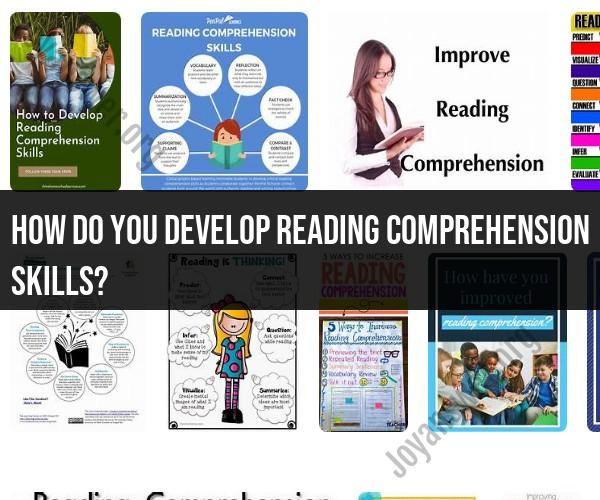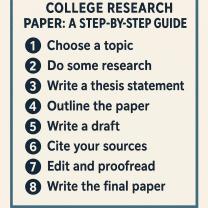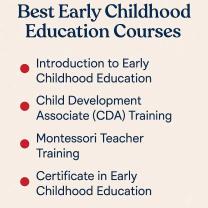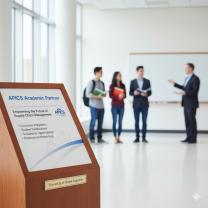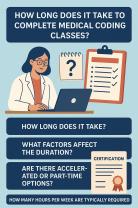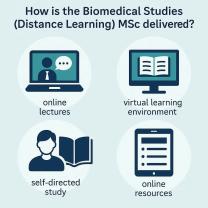How do you develop reading comprehension skills?
Developing strong reading comprehension skills is crucial for understanding, retaining, and critically analyzing the content you read. Whether you're a student, a professional, or just someone looking to improve their reading comprehension, here is a comprehensive guide on how to develop these skills:
Active Reading:
Preview the Text: Before you start reading, skim through the text to get an overview. Look at headings, subheadings, and any illustrations or charts to grasp the main ideas.
Ask Questions: As you read, constantly ask yourself questions about the text. This can help you stay engaged and focused on the content.
Take Notes: Jot down key points, summaries, or questions as you read. This helps you process and remember information.
Summarize: After reading a section or a chapter, try to summarize what you've just read in your own words. This reinforces your understanding.
Visualize: Create mental images based on the text. Visualizing the content can make it more memorable.
Connect: Relate what you're reading to your own experiences, prior knowledge, or other things you've read. Making connections enhances comprehension.
Vocabulary Building:
Expand Your Vocabulary: A strong vocabulary is essential for understanding complex texts. Make an effort to learn new words and their meanings.
Context Clues: Learn how to use context clues to figure out the meaning of unfamiliar words. Pay attention to how words are used in sentences.
Reading Regularly:
Read Widely: Reading a variety of materials, including fiction, non-fiction, newspapers, and academic texts, can improve your comprehension skills.
Set Goals: Establish a reading routine and set achievable reading goals. Regular practice is key to improvement.
Enhance Concentration:
Eliminate Distractions: Find a quiet, comfortable place to read without distractions.
Stay Focused: Train your mind to stay focused on the text. If your mind wanders, gently bring it back to the reading material.
Inferencing and Critical Thinking:
Make Inferences: Look for information in the text that is not explicitly stated. Inference involves drawing conclusions based on evidence.
Question the Text: Be critical of what you read. Ask questions about the author's purpose, bias, and the credibility of the information.
Compare and Contrast: Compare the content you are reading with other sources or your own knowledge to evaluate its reliability and significance.
Practice with Different Types of Texts:
Challenge Yourself: Don't limit yourself to easy or familiar materials. Read texts that are more challenging to improve your comprehension skills.
Variety: Include different genres, formats, and styles of writing in your reading practice.
Discussion and Reflection:
Discuss What You Read: Engage in discussions with others about what you've read. This helps reinforce your understanding and exposes you to different perspectives.
Reflect and Review: After you finish reading a book or article, take time to reflect on what you've learned and how it relates to your existing knowledge.
Seek Feedback:
- Ask for Feedback: If you're reading for academic or professional purposes, seek feedback from teachers, professors, or colleagues on your comprehension and analysis of the material.
Use Online Resources:
- Online Courses: There are many online courses and resources that focus on improving reading comprehension skills. Consider enrolling in one of these.
Patience and Perseverance:
- Remember that improving reading comprehension skills takes time. Be patient and persistent in your efforts.
Read Aloud: Reading the text aloud can help reinforce your understanding and improve retention, especially when dealing with complex material.
Take Breaks: When reading lengthy texts, take short breaks to recharge and refocus your mind.
Remember that everyone's reading comprehension skills develop at their own pace. Consistent practice, active engagement with the material, and a commitment to improving will lead to significant progress over time.
Developing Reading Comprehension Skills: A Comprehensive Guide.
Reading comprehension is the ability to understand the meaning of what you read. It is a complex skill that involves a number of different cognitive processes, including decoding, vocabulary, background knowledge, and inferencing.
Reading comprehension is essential for academic success and for lifelong learning. It allows us to access information from books, articles, and other written materials. It also allows us to understand the world around us and to make informed decisions.
There are a number of things that can be done to develop reading comprehension skills. Here are a few tips:
- Read regularly. The more you read, the better you will become at understanding what you read.
- Choose texts that are at your appropriate reading level. If the text is too difficult, you will likely become frustrated and give up.
- Use active reading strategies. This means paying attention to what you are reading and asking yourself questions about the text.
- Build your vocabulary. The more words you know, the better you will be able to understand what you read.
- Make connections between what you are reading and what you already know. This will help you to understand and retain the information.
Strategies to Enhance Reading Comprehension in All Age Groups.
There are a number of strategies that can be used to enhance reading comprehension in all age groups. Here are a few examples:
- Preview the text. This means taking a few minutes to skim the text and look at the headings and subheadings. This will give you a general idea of what the text is about.
- Predict what will happen next. As you are reading, try to predict what will happen next. This will help you to stay engaged with the text and to better understand the meaning.
- Ask yourself questions about the text. This will help you to think about what you are reading and to deepen your understanding.
- Summarize the text in your own words. This is a great way to check your understanding and to identify any areas where you need clarification.
- Discuss the text with others. Talking about what you have read with others can help you to better understand the text and to retain the information.
Building Critical Reading Skills for Academic Success.
Critical reading skills are essential for academic success. Critical readers are able to analyze and evaluate what they read. They are able to identify the main idea of a text, the supporting details, and the author's purpose. They are also able to identify and evaluate different perspectives.
There are a number of things that can be done to build critical reading skills. Here are a few tips:
- Identify the main idea and supporting details of a text. The main idea is the central message of the text. The supporting details are the facts and examples that the author uses to support the main idea.
- Identify the author's purpose. The author's purpose is the reason why the text was written. The author's purpose may be to inform, persuade, or entertain.
- Identify and evaluate different perspectives. Many texts present different perspectives on a topic. It is important to be able to identify and evaluate these perspectives in order to form your own opinion.
- Ask yourself critical questions about the text. Here are a few examples of critical questions that you can ask yourself:
- What is the author's evidence to support their claims?
- Is the author's evidence credible?
- Does the author consider all sides of the issue?
- Is the author's argument logical?
- What is the author's bias?
Improving Reading Comprehension Through Active Reading.
Active reading is a strategy for improving reading comprehension. It involves paying attention to what you are reading and asking yourself questions about the text.
Here are a few tips for active reading:
- Preview the text. This means taking a few minutes to skim the text and look at the headings and subheadings. This will give you a general idea of what the text is about.
- Make predictions. As you are reading, try to predict what will happen next. This will help you to stay engaged with the text and to better understand the meaning.
- Ask yourself questions about the text. This will help you to think about what you are reading and to deepen your understanding.
- Annotate the text. This means writing notes in the margins of the text or highlighting important passages. This can help you to identify key ideas and to connect different parts of the text.
- Summarize the text in your own words. This is a great way to check your understanding and to identify any areas where you need clarification.
The Role of Practice and Persistence in Reading Comprehension Development.
Reading comprehension is a skill that takes time and practice to develop. It is important to be patient and persistent in your efforts to improve your reading comprehension skills.
